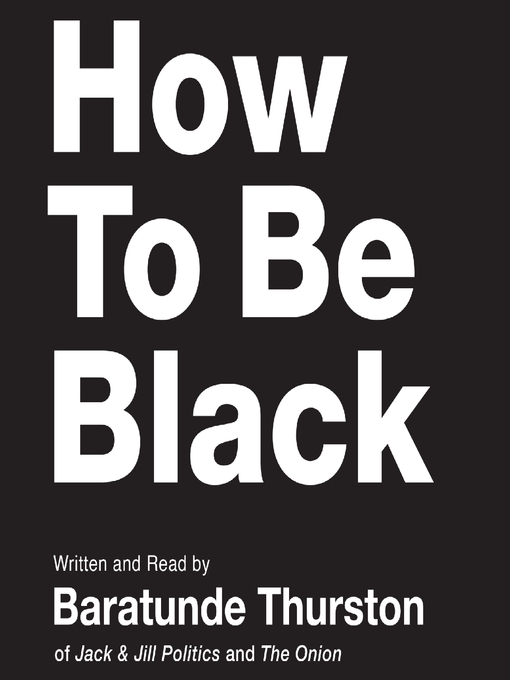
How to Be Black
فرمت کتاب
audiobook
تاریخ انتشار
2012
نویسنده
Baratunde Thurstonناشر
HarperAudioشابک
9780062061614
کتاب های مرتبط
- اطلاعات
- نقد و بررسی
- دیدگاه کاربران
نقد و بررسی

January 23, 2012
In this hilarious blend of razor-sharp satire and memoir, Onion editor and cofounder of the Jack & Jill Politics blog Thurston muses on how, generally, to be black in today’s ever-changing world. He’s quick to point out that his book is not a magic potion that will make readers instantly black (it is not How to Become a Black Person If You Are Not Already Black). Instructive chapters include “How to Be The Black Friend” and its corollaries, “How to Speak for All Black People” and “How to Be The Black Employee.” Thurston’s life was shaped by his mother, a force of nature who instilled in him a love of camping and bicycling, along with a fiercely radical spirit. As a teen, he participated in the Ankobia program in D.C. taught by Pan-African black American activists. This same woman also enrolled him in the prestigious Sidwell Friends school (home to Chelsea Clinton and President Obama’s daughters) and cheered at his Harvard graduation. In order to get a fuller picture of blackness in America today, Thurston assembles “The Black Panel,” consisting of artists and stand-up comedians who address race in their work. Questions he poses to panel include when the members first realized they were black (most were very young), if they ever wished not to black (very few did), and what they thought of the idea of “post-racial America.” Using his own story and humor, Thurston demonstrates that the best way to “be” anything is to simply be yourself. Agent: Gary Morris.

January 1, 2012
Comedian and Onion director of digital Thurston (Better Than Crying: Poking Fun at Politics, the Press & Pop Culture, 2003) delivers a "book about the ideas of blackness" in the guise of a helpful how-to guide to being black. The author and a "Black Panel" made up of friends and colleagues, including one white person to avoid charges of reverse discrimination and also as a control group, ponder many questions about being black--e.g., "When did you first realize you were black?" and "Can you swim?" However, the humor does not serve the role of making light of race and racism, but rather as a gentle skewering that invites serious consideration of how black Americans are often limited by certain expectations concerning blackness. In "How to Speak for All Black People," Thurston challenges the assumption that one black person can speak to the experience of an entire race, as well as the assumption that a black person can only speak to the black experience. In "How to Be the Black Employee," he confronts the challenges of being hired both for the job and for being black--you will and must be, for instance, featured in every company photo. The humor does not always work; at times it is blog-like cleverness for the sake of cleverness (and is yet another joke about blacks needing white friends to get a cab really needed?). Thurston is at his best when he writes about his own life: growing up in Washington, D.C., attending Sidwell Friends School, matriculating at Harvard ("my experience of race at Harvard was full of joy and excitement"). The key to greater harmony is not necessarily seeing beyond race, but, as one Black Panelist puts it, to "see that and all of the things that I have done, to embrace all of me." Flawed but poignant and often funny.
(COPYRIGHT (2012) KIRKUS REVIEWS/NIELSEN BUSINESS MEDIA, INC. ALL RIGHTS RESERVED.)

February 1, 2012
Humorist Thurston has found plenty of fodder in his personal life for his work as a stand-up comedian and writer. He grew up in Washington, D.C., between the hopes of his mother's Afrocentrism and the harsh realities of his father's drug addiction. Sidwell Friends and Harvard, educators of the children of power and privilege, inspired a host of how to coping skills that he shares with poignancy and humor. He takes on the challenges of how to speak for every black person in the nation, how to measure degrees of blackness, how to take a break from it all. To his memoir he adds commentary by a panel of experts (three black women, three black men, and one white man) to ponder black identity and how to be black in situations from friendship to careers to the highest political office in the U.S. Baratunde, The Onion's director of digital communications and cofounder of Jack & Jill Politics, offers a hilarious look at the complexities of contemporary racial politics and personal identity.(Reprinted with permission of Booklist, copyright 2012, American Library Association.)

























دیدگاه کاربران